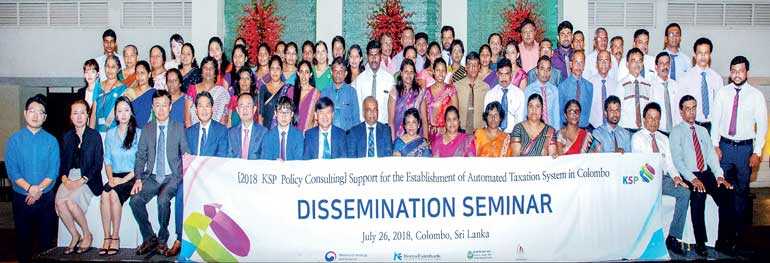Sunday Feb 22, 2026
Sunday Feb 22, 2026
Thursday, 2 August 2018 00:00 - - {{hitsCtrl.values.hits}}

The Knowledge Sharing Program (KSP) policy consultation supported by the Export-Import Bank of Korea (Korea Eximbank) to set up a master plan for the establishment of an advanced automated taxation system for Colombo Municipality has been successfully carried out from February to July 2018. The final dissemination seminar was held on 26 July in Colombo with the participation of Colombo Municipal Council (CMC) officials including the Deputy Municipal Commissioner Thamara Mallawarachchi.
In particular, Colombo is the economic centre of the country experiencing rapid urbanisation and land development resulting on higher tax rates imposed on land and buildings which account for 28% of total budget of CMC. However, due to existing manual taxing method, CMC is currently facing serious challenges such as uncertain data on taxable property, missing to charge tax, inefficient administrative procedures and so on. Considering this urgent need to build a strong tax information system, especially for the Colombo city which generates considerably high amounts of tax, this consulting program produced policy recommendations and a framework to promote the development of the future CMC tax administration system by capitalising on the experience of establishing the advanced tax information system in Seoul, South Korea. Thus an improvement model has been proposed which is largely aimed at components such as standardisation of administrative work among CMC’s internal divisions, establishment of a system for external linkages with other land related agencies, integration of databases, improvement of efficiency in rates assessment by linking land information with the existing GIS system, digitalisation of assessment related formats, and establishment of a portal for taxpayers. Furthermore, future directions have been proposed including revitalising the Single Window Centre to integrate all local taxation services.
If this proposed framework for automated taxation gets implemented in future, it will not only help CMC to become a model in taxation and administration to other local authorities in the country but it will also contribute to Sri Lankan government’s plan to establish the e-government to reform taxation administration and cut fiscal deficits in the long-run.